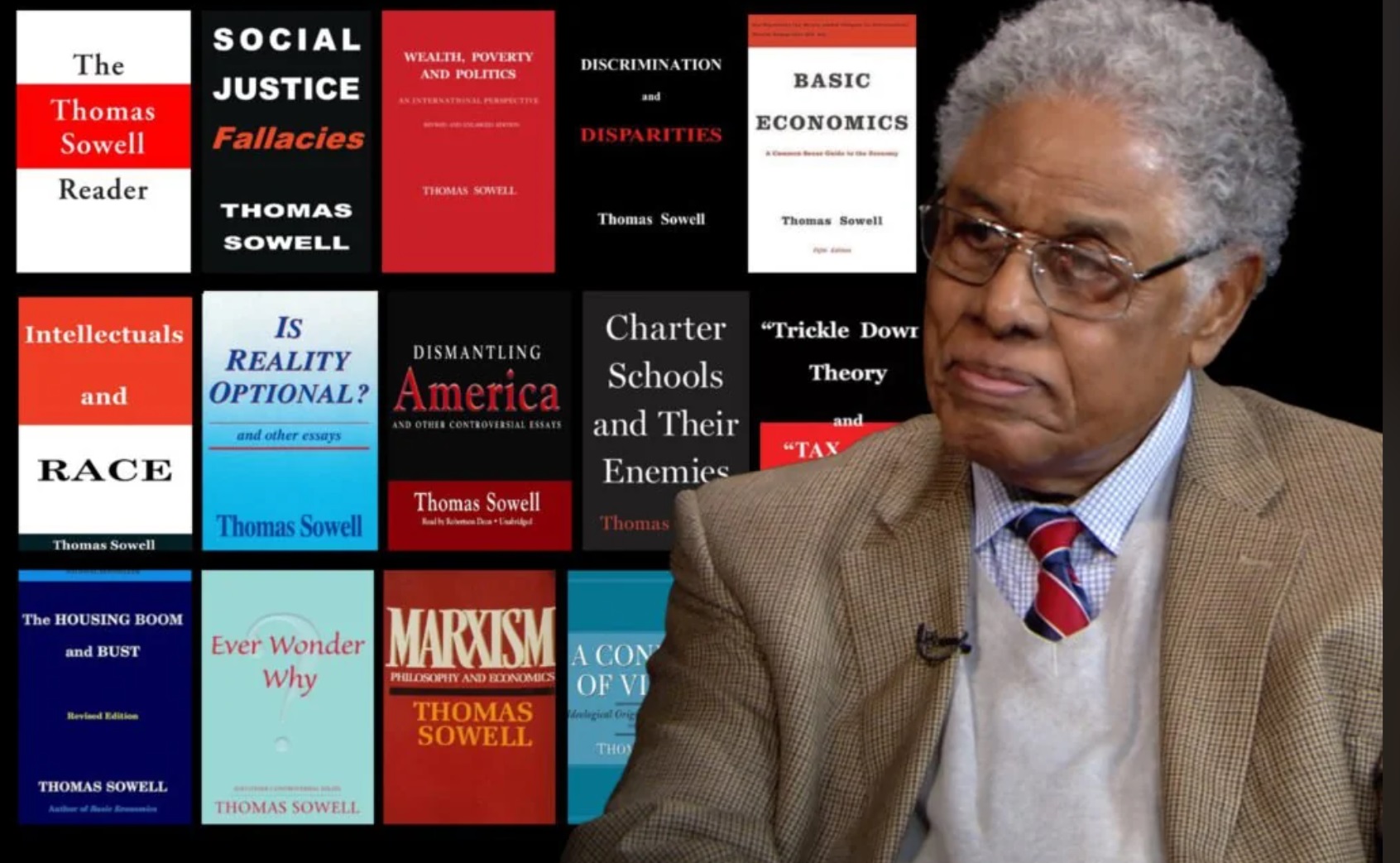The Undervalued Wisdom and Writings of Thomas Sowell
Thomas Sowell, an American economist, social theorist, and senior fellow at the Hoover Institution, stands as a towering intellectual figure whose work has profoundly influenced contemporary thought. Born in 1930 in Gastonia, North Carolina, Sowell’s journey from poverty to prominence is a testament to his intellectual rigor and unyielding dedication to truth. His writings span a multitude of subjects, including economics, history, social policy, and race relations, offering penetrating insights and challenging conventional wisdom. This essay aims to explore the depth of Sowell’s ideas, highlighting the enduring relevance of his wisdom through his memorable quotes.
Early Life and Education
Thomas Sowell was born into a poor family during the Great Depression. Orphaned early, he was raised by an aunt in Harlem, New York City. His early life was marked by economic hardship and a strong sense of self-reliance. Sowell’s educational journey was non-traditional; he dropped out of high school, joined the Marine Corps during the Korean War, and later attended Harvard University, graduating magna cum laude. He earned a master’s degree from Columbia University and a doctorate in economics from the University of Chicago, where he studied under the mentorship of renowned economist Milton Friedman.
Economic and Social Theories
One of Sowell’s most significant contributions is his critique of social and economic policies that, according to him, often produce outcomes contrary to their intentions. His book, “Basic Economics,” demystifies economic principles for the layperson, emphasizing that economic decisions are about trade-offs and consequences. Sowell’s assertion that “There are no solutions, only trade-offs” underscores his pragmatic approach to policy analysis.
Quote: “The first lesson of economics is scarcity: There is never enough of anything to satisfy all those who want it. The first lesson of politics is to disregard the first lesson of economics.”
– Thomas Sowell
Sowell argues that political decisions often ignore economic realities, leading to policies that exacerbate the very problems they intend to solve. For instance, he critiques minimum wage laws, positing that they lead to higher unemployment among low-skilled workers. His empirical analyses reveal that while such laws aim to increase earnings for the poorest workers, they often result in job losses that disproportionately affect the very groups they intend to help.
Critique of Affirmative Action
Sowell is a vocal critic of affirmative action, arguing that it often harms those it purports to assist. In “Affirmative Action Around the World: An Empirical Study,” he presents data showing that such policies can lead to a mismatch between students and institutions, resulting in higher dropout rates and lower academic performance among beneficiaries.
Quote: “The fact that so many successful politicians are such shameless liars is not only a reflection on them, it is also a reflection on us. When the people want the impossible, only liars can satisfy.”
– Thomas Sowell
Sowell’s analysis suggests that affirmative action, while well-intentioned, often fails to address the underlying causes of disparities and instead promotes a culture of dependency and entitlement. He advocates for merit-based policies and emphasizes the importance of individual responsibility and effort.
Views on Race and Culture
Sowell’s writings on race and culture challenge many prevailing narratives. In “Black Rednecks and White Liberals,” he argues that cultural factors, rather than systemic racism, play a significant role in the socioeconomic outcomes of different racial and ethnic groups. He traces the cultural roots of behaviors and attitudes that hinder economic progress, urging a focus on cultural change rather than solely on policy interventions.
Quote: “Racism is not dead, but it is on life support—kept alive by politicians, race hustlers, and people who get a sense of superiority by denouncing others as ‘racists.’” – Thomas Sowell
Sowell’s perspective is that while racism exists, its impact is often overstated and exploited for political and economic gain. He calls for a focus on personal responsibility, education, and the dismantling of cultural barriers to progress.
Education and Intellectual Development
Sowell’s critiques extend to the education system, which he believes often stifles intellectual development rather than fostering it. In “Inside American Education,” he highlights how educational institutions are more focused on ideological indoctrination than on equipping students with critical thinking skills.
Quote: “Too much of what is called ‘education’ is little more than an expensive isolation from reality.”
Sowell advocates for an education system that prioritizes knowledge, skills, and intellectual independence. He is a proponent of school choice and criticizes teachers’ unions for prioritizing their interests over those of students.
Economic Freedom and Capitalism
A staunch advocate of free-market capitalism, Sowell argues that economic freedom is the cornerstone of prosperity and social progress. In “Basic Economics” and other works, he dismantles arguments for socialism and government intervention, illustrating how markets allocate resources more efficiently and equitably than central planning.
Quote: “The most basic question is not what is best, but who shall decide what is best.”
– Thomas Sowell
Sowell’s work emphasizes the importance of individual freedom and the dangers of allowing centralized authorities to dictate economic and social policies. He points to historical and contemporary examples to show how markets, driven by voluntary exchanges, create wealth and improve living standards.
Influence and Legacy
Despite his significant contributions, Sowell’s ideas often receive less attention in mainstream discourse compared to more politically palatable viewpoints. His rigorous analysis and unapologetic commitment to truth make him a polarizing figure. However, his influence is profound among those who seek a deeper understanding of economic and social dynamics beyond ideological narratives.
Quote: “It takes considerable knowledge just to realize the extent of your own ignorance.”
– Thomas Sowell
Sowell’s legacy lies in his relentless pursuit of knowledge and his ability to communicate complex ideas with clarity and precision. His writings encourage critical thinking and challenge readers to question widely accepted beliefs.
Applications of Sowell’s Wisdom Today
The relevance of Sowell’s ideas is evident in contemporary debates on economic policy, social justice, and education reform. His emphasis on empirical evidence and logical reasoning provides a framework for addressing today’s challenges.
- Economic Policy: Sowell’s insights into the consequences of government intervention and regulation are crucial in current discussions on fiscal and monetary policy. His arguments for market-based solutions and economic freedom offer a pathway to sustainable growth and prosperity.
- Social Justice: In an era where social justice movements dominate discourse, Sowell’s critique of policies like affirmative action and his focus on cultural factors provide a counterpoint to mainstream narratives. His work encourages a reevaluation of strategies aimed at achieving equality and highlights the importance of individual agency and responsibility.
- Education Reform: Sowell’s analysis of the education system’s failings is particularly relevant as educators and policymakers seek to improve outcomes. His advocacy for school choice and emphasis on critical thinking skills align with efforts to create more effective and equitable educational opportunities.
- Race Relations: Sowell’s nuanced understanding of race and culture challenges simplistic explanations of disparities and calls for a more comprehensive approach to addressing issues of inequality. His work underscores the need for policies that empower individuals and promote cultural change.
Thomas Sowell’s Wisdom
Thomas Sowell’s wisdom and writings offer a rich tapestry of insights that challenge conventional thinking and provide a roadmap for addressing complex social and economic issues. His life story, from humble beginnings to intellectual prominence, embodies the principles of hard work, resilience, and intellectual curiosity. Through his meticulous research and eloquent prose, Sowell has left an indelible mark on the landscape of modern thought.
Quote: “People who pride themselves on their ‘complexity’ and deride others for being ‘simplistic’ should realize that the truth is often not very complicated. What gets complex is evading the truth.” – Thomas Sowell
In an age where ideological echo chambers often drown out reasoned discourse, Sowell’s commitment to truth and empirical evidence stands as a beacon of intellectual integrity. His work invites us to engage with ideas critically, question assumptions, and strive for a deeper understanding of the world around us. For these reasons, the wisdom and writings of Thomas Sowell remain undervalued treasures, deserving of greater recognition and appreciation in our ongoing quest for knowledge and progress.





